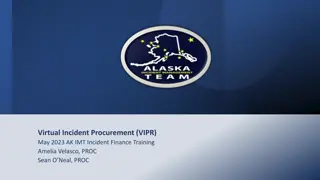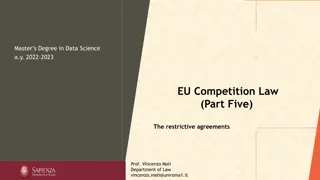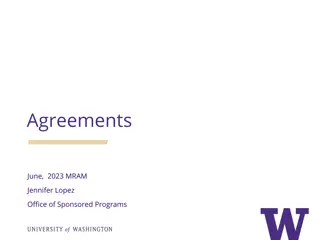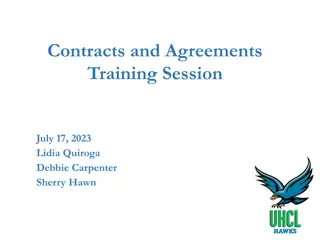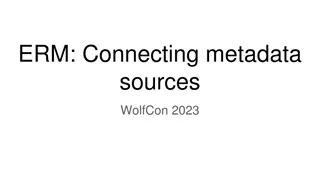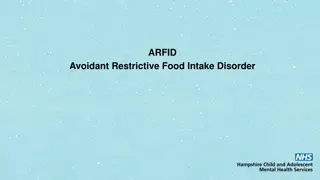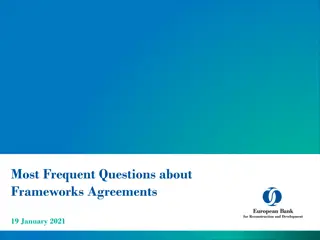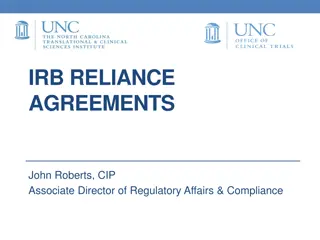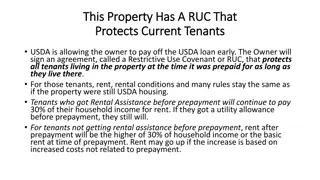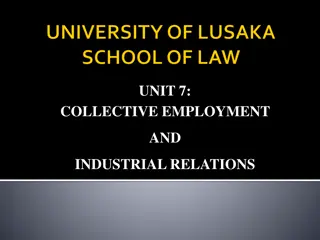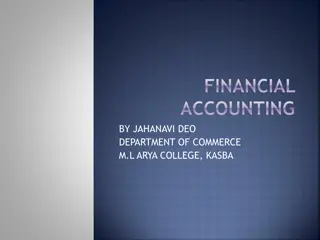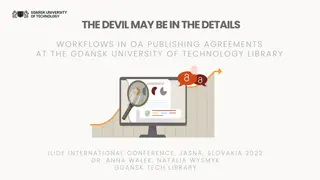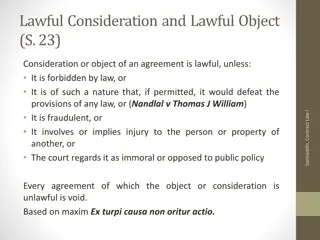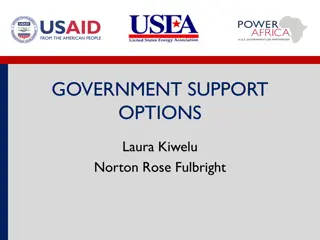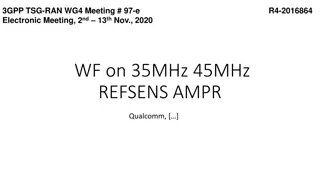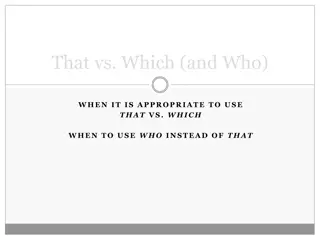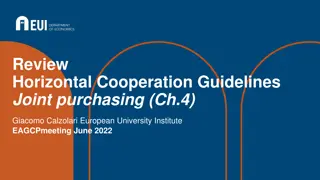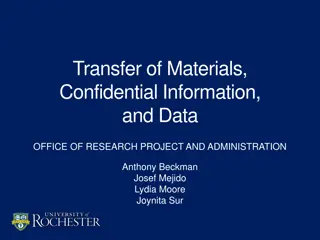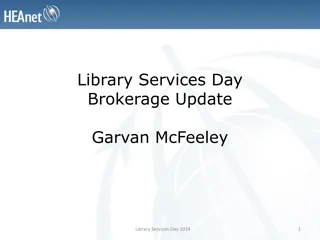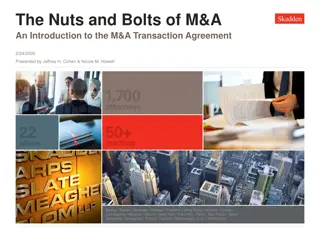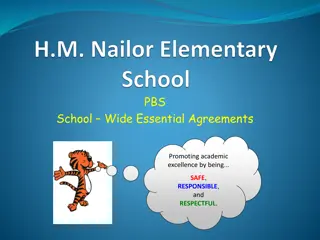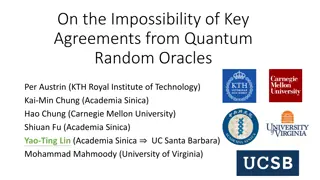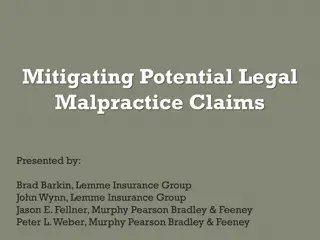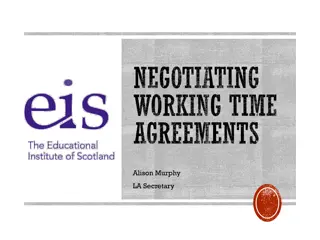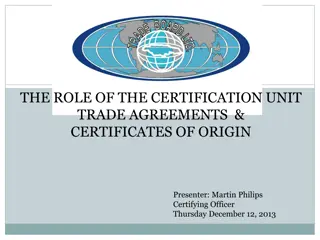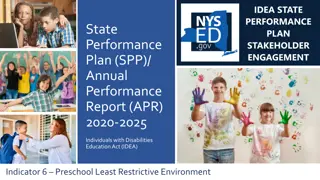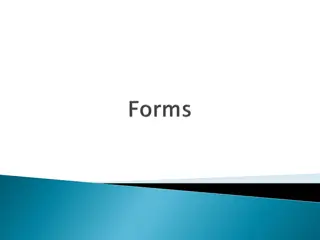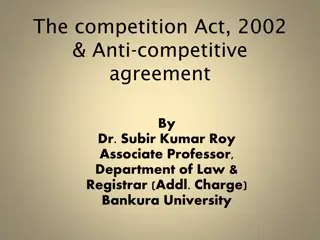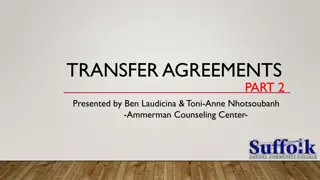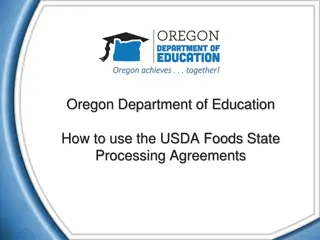Understanding Virtual Incident Procurement (VIPR) in Government Agencies
Virtual Incident Procurement (VIPR) is a web-based system used by the United States Department of Agriculture, Forest Service (USDA-FS) for incident procurement. It includes Incident Blanket Purchase Agreements (I-BPA) that allow Contracting Officers to create, award, and manage solicitation and agr
3 views • 37 slides
Understanding Data Use Agreements (DUAs) in Sponsored Projects Office
Data Use Agreements (DUAs) are contractual agreements between data providers and recipients, ensuring proper handling of non-public data, especially data subject to restrictions like HIPAA. DUAs address data use limitations, liability, publication, exchange, storage, and protection protocols. HIPAA
6 views • 19 slides
Legal Aspects of Owning a Manpower Franchise_ Understanding Contracts and Agreements
Owning a manpower franchise comes with a range of legal considerations, particularly concerning contracts and agreements. Understanding these legal aspects is crucial for franchisees to protect their interests, comply with regulations, and maintain positive relationships with clients and candidates.
2 views • 3 slides
Understanding Restrictive Agreements and EU Competition Law
Restrictive agreements in the context of EU Competition Law involve collusion among undertakings to prevent, restrict, or distort competition. This includes fixing prices, controlling production, sharing markets, and imposing unfair conditions. The profitability of collusion in oligopolistic markets
0 views • 36 slides
Office of Sponsored Programs - Agreements and Contracts Update
Explore the latest updates on agreements and contracts from the Office of Sponsored Programs, featuring a refreshed agreement types resource, a decision tree for new agreements, and a team led by Jennifer Lopez. Get insights into the roles of key contract specialists and stay informed on the collabo
0 views • 5 slides
Contracts and Agreements Training Session Overview
This detailed training session covers various aspects of contracts and agreements, including different types of contracts, standard vs. non-standard contracts, examples of common agreements, and less common agreements such as affiliation, facility license, and memorandum of understanding. The sessio
1 views • 26 slides
Understanding Folio Agreements and Resource Management
Folio agreements facilitate access to resources by defining terms of use and linking resources to agreements via agreement lines. Different types of agreement lines provide diverse ways to describe covered resources, whether internal, external, or detached. Populating the internal knowledge base inv
0 views • 14 slides
Understanding ARFID: A Guide to Avoidant Restrictive Food Intake Disorder
Avoidant Restrictive Food Intake Disorder (ARFID) is a feeding and eating disorder characterized by significant weight loss, nutritional deficiency, and psychosocial impairment. Individuals may experience sensory sensitivity, lack of interest, or fear of aversive consequences. ARFID differs from pic
0 views • 18 slides
Understanding Framework Agreements in Procurement
Framework agreements are contracts between procuring entities and selected suppliers or contractors. They are useful for recurring or urgent procurement needs. These agreements go through a two-stage procedure, involving selection of parties and awarding contracts. There are two types of framework a
0 views • 10 slides
Understanding IRB Reliance Agreements in Research
IRB reliance agreements allow institutions to delegate IRB review responsibilities or collaborate with other institutions for human subjects research. Federalwide assurance (FWA) documents ensure compliance with regulations. Different types of agreements, such as IRB authorization agreements and ind
0 views • 23 slides
Overview of Cooperative Game Theory and Bargaining Solutions
Cooperative game theory explores situations where players have mutual benefits in cooperating. The focus is on bargaining solutions to reach agreements despite conflicting interests. Key concepts include Nash Bargaining Solution, Kalai-Smorodinsky Bargaining Solution, and Rubinstein Bargaining Proce
1 views • 24 slides
Tenants' Rights in Properties with Restrictive Use Covenant (RUC)
In properties with a Restrictive Use Covenant (RUC), current tenants are protected even after an owner pre-pays a USDA loan early. The RUC safeguards tenants' rental conditions, limits rent increases, and provides additional protections such as the right to a grievance process. Tenants have options
0 views • 5 slides
Understanding Collective Employment and Industrial Relations
Collective employment involves negotiations between employers and employee representatives to establish working conditions, wages, and more. These agreements, known as collective bargaining agreements, are crucial in defining the terms of employment. International conventions recognize the right to
0 views • 44 slides
Understanding Financial Accounting Concepts in Royalty Agreements
This article delves into key concepts in financial accounting related to royalty agreements, such as minimum rent, redeemable dead rent/shortworking, recoupment of shortworking, strike and lock-out impacts, and surplus. Learn about these terms and their implications in royalty agreements.
0 views • 6 slides
Insights into Open Access Publishing Agreements at Gdansk University of Technology Library
Delve into the detailed workflows and criteria surrounding Open Access publishing agreements at the Gdansk University of Technology Library, including transformative agreements, subscription criteria assessment, open access criteria assessment, and eligibility workflows for authors and articles. Exp
0 views • 11 slides
Understanding Lawful Consideration and Public Policy in Contracts
Lawful consideration and public policy play vital roles in determining the validity of agreements. According to Section 23 and Section 24 of contract law, consideration and object must be lawful, and agreements are void if they involve unlawful elements. Public policy considerations guide the judici
0 views • 4 slides
Understanding Government Support Agreements in Infrastructure Projects
Government support agreements play a crucial role in infrastructure projects by outlining various forms of support provided by the government to ProjectCo. These agreements help allocate risks appropriately, ensure credit enhancement, and provide direct or indirect support. However, hindrances such
1 views • 15 slides
Guidelines on Restrictions for Plans of Subdivision
The document outlines new requirements for restrictive covenants in transfers and restrictions in plans of subdivision. These guidelines aim to improve processing efficiencies, minimize errors, and enhance overall customer experience by streamlining the examination process and reducing the need for
1 views • 20 slides
Understanding Non-Compete Agreements: Enforceability and Requirements
Non-compete agreements are commonly used in the United States to protect businesses from competition by former employees. To be enforceable, these agreements must meet certain requirements, including independent consideration, protection of legitimate business interests, and reasonableness in scope,
0 views • 26 slides
Highlights from 3GPP TSG-RAN WG4 Meeting #97-e - November 2020
Various companies presented contributions for AMPR and REFSENS for 35MHz and 45MHz channel bandwidths at the electronic meeting of 3GPP TSG-RAN WG4. Discussions included agreements, issues related to n8, n25, and n71 45MHz REFSENS, UL configurations for different regions and carriers, A-MPR agreemen
0 views • 8 slides
Proper Use of "That" vs. "Which" and When to Use "Who
Understand the distinctions between "that" and "which" when introducing restrictive and nonrestrictive clauses, as well as when to use "who" instead of "that" to refer to a person. "That" is used for restrictive clauses essential to the sentence's meaning, while "which" is for nonrestrictive clauses
0 views • 6 slides
Risks and Considerations in Joint Purchasing Agreements
Evaluating the potential risks associated with joint purchasing agreements, this review explores factors such as competition effects, buyer-seller relationships, and downstream impacts. It highlights the importance of distinguishing between buyer cartels and acceptable joint purchase agreements to e
0 views • 13 slides
Guide to Material Transfer Agreements and Data Negotiations in Research
Explore the key aspects of Material Transfer Agreements (MTAs), Confidentiality Agreements, and Data Use Agreements in research projects. Learn about the types of agreements negotiated, entities involved, the process for obtaining fully executed agreements, and how to get started as a Principal Inve
2 views • 28 slides
Comprehensive Library Services Day Brokerage Update and Agreements Overview
Applying a systematic and collaborative approach with clients and vendors, the library services day brokerage provides a portfolio of agreements to meet client needs effectively. Through negotiation and ongoing services, the workload in complying with procurement rules is reduced. The current portfo
0 views • 29 slides
Understanding M&A Transaction Agreements and Agreements Structure
This overview delves into the types of M&A transaction agreements, such as Stock Purchase Agreements and Merger Agreements, along with the basic agreement structure encompassing definitions, purchase price mechanics, representations, warranties, covenants, conditions, termination, and indemnificatio
2 views • 31 slides
School Wide Essential Agreements for Promoting Academic Excellence
School-wide essential agreements promote academic excellence by encouraging students to be safe, responsible, and respectful. Various agreements cover aspects like behavior in assembly, on field trips, in the cafeteria, and even when loading the bus. These agreements emphasize qualities that contrib
6 views • 20 slides
Comprehensive Guide on Hotel Agreements and Procurement Services
Explore detailed information on preferred hotels, procurement services, accessing hotel agreements, booking procedures, and cancellation policies. Discover how to navigate travel websites, locate agreements, view supplier summaries, and manage purchasing agreements effectively.
0 views • 47 slides
Understanding Eating Disorders: An Overview from University of Basra College of Nursing
Eating disorders have a long history, with anorexia nervosa established as a mental disorder in the 1960s and bulimia nervosa described later. These disorders can be viewed on a continuum, with anorexia, bulimia, and obesity at different ends. Anorexia nervosa is characterized by restrictive behavio
0 views • 30 slides
The Link Between Picky Eating and Avoidant/Restrictive Food Intake Disorder in High School Students
Picky eating behaviors in children can potentially lead to Avoidant/Restrictive Food Intake Disorder (ARFID) if not outgrown by age 6. Research indicates that parental pressure, aversive experiences, and specific eating characteristics are associated with picky eating tendencies that may predict ARF
0 views • 16 slides
Quantum Key Agreements and Random Oracles
This academic paper explores the impossibility of achieving key agreements using quantum random oracles, discussing the challenges and limitations in quantum communication, cryptographic protocols, quantum computation, and classical communication. The study delves into the implications of quantum ra
0 views • 29 slides
Education and Inclusion of Children with Disabilities in the United States
The history and evolution of educating and caring for children with disabilities in the United States, from community responsibility to the Disability Rights Movement. Legislation such as the Individuals with Disabilities Education Act of 1997 has aimed to ensure inclusion, as seen in requirements f
0 views • 23 slides
Mitigating Potential Legal Malpractice Claims: Strategies and Considerations
This content discusses strategies to mitigate potential legal malpractice claims, including the importance of detailed written engagement agreements, fee agreements, scope of legal services, duties to non-clients, conflicts of interest, and statutory requirements. It emphasizes the significance of c
0 views • 40 slides
Negotiating Working Time Agreements in School Settings
Course overview on negotiating working time agreements, preparation, and audit processes in educational institutions. Covers the formulation and implementation of School Improvement Plans, collective agreements between trade unions and school authorities, and the allocation of working hours for teac
0 views • 30 slides
Understanding Obstructive and Restrictive Lung Diseases
Explore the differences between obstructive and restrictive lung diseases through detailed images and descriptions of upper airway obstructions, intrathoracic versus extrathoracic limitations, and how to interpret flow-volume loops. Learn about common conditions like COPD and asthma affecting inspir
0 views • 36 slides
The Role of Certification Unit in Trade Agreements & Certificates of Origin
The Trade Board Limited, a government agency, plays a crucial role in issuing Certificates of Origin and import/export licenses for Jamaican products. They ensure compliance with trade agreements, facilitate e-transactions, and promote secure frameworks. The mission is to enhance local and internati
0 views • 62 slides
Preschool Least Restrictive Environment: Indicator 6 under IDEA
The State Performance Plan (SPP) and Annual Performance Report (APR) for 2020-2025 focus on Indicator 6 of the Individuals with Disabilities Education Act (IDEA) concerning Preschool Least Restrictive Environment. This plan evaluates state efforts to implement IDEA requirements and improve their imp
0 views • 57 slides
Real Estate Agreements and Purchase Forms Overview
Explore a variety of real estate forms and agreements used in property transactions, including sales agreements, listing contracts, buyer representation agreements, and more. Understand the specifics of each document and their importance in buying or selling property.
0 views • 31 slides
The Competition Act, 2002 & Anti-Competitive Agreements: Overview
The Competition Act, 2002 primarily focuses on prohibiting anti-competitive agreements, preventing abuse of dominant positions, regulating combinations, and establishing the Competition Commission of India. Section 3 of the Act specifically prohibits agreements that have an adverse impact on competi
0 views • 15 slides
Understanding Transfer Agreements in Higher Education
Discover the significance of transfer agreements in higher education through joint admission and articulation agreements. Learn how transfer agreements facilitate seamless credit transfers, maximize course transferability, and simplify the application process for students transitioning from communit
1 views • 8 slides
Understanding USDA Foods State Processing Agreements in Oregon
The Oregon Department of Education works with state distributing agencies and school districts to leverage USDA Foods and convert them into convenient end products through processing agreements. Various levels of government can make regulations regarding nonprofit food service accounts, ensuring com
0 views • 13 slides
